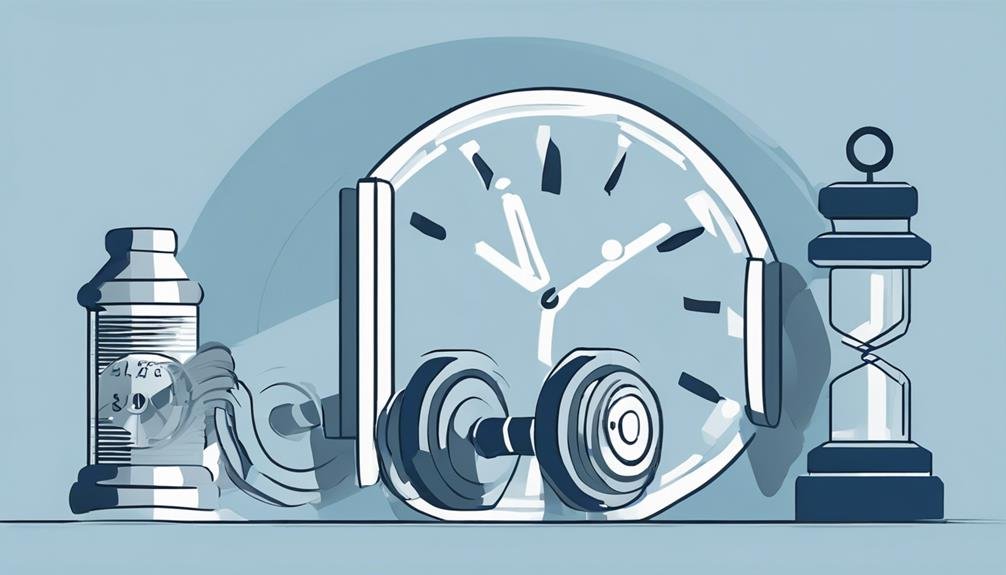Intermittent Fasting: Balancing Testosterone for Fit Men 40
Intermittent fasting can be a game changer for you as a fit man over 40, helping balance testosterone levels. By choosing methods like 16/8 or 5:2, you can enhance fat loss, boost energy, and support muscle development. Fasting enhances insulin levels and promotes muscle-building hormones like growth hormone. Combine it with a nutritious diet full of lean proteins, healthy fats, and fiber-rich veggies, and you'll maximize your results. Regular exercise, especially resistance training and HIIT, also plays an essential role in maintaining testosterone levels. Discover how to fine-tune your approach for ideal results and well-being.
Key Takeaways
- Intermittent fasting, like the 16/8 method, can help regulate insulin levels and enhance testosterone production in men over 40.
- Maintaining a balanced diet rich in lean proteins, healthy fats, and fiber supports testosterone levels during fasting periods.
- Regular resistance training and HIIT workouts boost testosterone and overall energy, crucial for fit men in their 40s.
- Hydration and nutrient-dense meals during eating windows are essential for sustaining energy and hormone balance while fasting.
Understanding Intermittent Fasting
Intermittent fasting is a flexible eating pattern that alternates between periods of eating and fasting, making it easier to manage your weight and boost your energy levels.
You can choose from various methods, such as the 16/8 method, where you fast for 16 hours and eat during an 8-hour window, or the 5:2 method, which involves eating normally five days a week and restricting calories on two non-consecutive days.
This approach not only simplifies meal planning but also helps regulate your body's insulin levels, promoting fat loss.
As you adapt, you'll likely find increased mental clarity and improved focus during fasting periods.
The Role of Testosterone

Testosterone plays an essential role in your overall health, influencing muscle mass, fat distribution, and energy levels as you age.
It's important for maintaining your strength, liveliness, and even mood.
As you hit your 40s, testosterone levels can begin to decline, making it harder to maintain muscle and manage weight.
This decline can lead to increased body fat, decreased motivation, and lower energy levels.
By prioritizing your testosterone health, you can combat these effects, enhancing your physical performance and overall well-being.
Proper nutrition, regular exercise, and lifestyle choices can support healthy testosterone levels, helping you feel more energetic and fit.
Understanding this connection empowers you to take charge of your health and stay active as you age.
How Fasting Affects Hormones
Fasting can greatly influence your hormone levels, including those that regulate metabolism, appetite, and even muscle growth.
When you fast, insulin levels drop, which helps your body utilize stored fat for energy. This reduction in insulin can promote fat loss while maintaining muscle mass.
Additionally, fasting triggers the release of growth hormone, which plays an essential role in muscle development and fat loss.
It also affects ghrelin and leptin, hormones responsible for hunger and satiety. As ghrelin decreases, you may find it easier to resist cravings, while leptin helps you feel full.
Benefits of Balanced Testosterone

Maintaining balanced testosterone levels is vital for enhancing your energy, mood, and overall fitness as you age.
When your testosterone is within a healthy range, you'll notice improved muscle mass and strength, making it easier to stay active and fit. Balanced testosterone also supports fat metabolism, helping you maintain a healthy weight.
It plays a significant role in regulating your mood, reducing feelings of irritability or anxiety, and contributing to better mental clarity.
Additionally, ideal testosterone levels can enhance libido and sexual performance, which are important aspects of a fulfilling life.
Intermittent Fasting Protocols
Balancing your testosterone levels can enhance your results from intermittent fasting, as different fasting protocols can help improve your body's hormonal responses and support your fitness journey.
You might consider the popular 16/8 method, where you fast for 16 hours and eat during an 8-hour window. Alternatively, the 5:2 approach allows you to eat normally for five days and restrict calories on two non-consecutive days.
For those looking for a more intense option, you could try alternate-day fasting, which involves cycling between fasting and eating days.
Choose a protocol that fits your lifestyle and preferences, as consistency is key.
Monitor how your body responds to each method, adjusting as needed to help maintain ideal testosterone levels and fitness results.
Nutrition During Fasting

While you're in a fasted state, it's important to focus on nutrient-dense foods during your eating windows to maximize your health and fitness benefits.
Prioritize whole foods that support your energy levels and testosterone production.
Incorporate these key components into your meals:
- Lean Proteins: Chicken, fish, or plant-based sources help repair muscles and keep you feeling full.
- Healthy Fats: Avocados, nuts, and olive oil provide sustained energy and support hormone balance.
Exercise and Testosterone Levels

Incorporating regular exercise into your routine can considerably boost your testosterone levels, enhancing both your fitness and overall well-being.
Resistance training, like weightlifting, is particularly effective at stimulating testosterone production. Aim for compound movements—squats, deadlifts, and bench presses—that engage multiple muscle groups. High-intensity interval training (HIIT) can also elevate hormone levels while improving cardiovascular health.
Consistency is key; aim for at least 150 minutes of moderate exercise or 75 minutes of vigorous exercise per week. Remember to allow adequate recovery time, as overtraining can have the opposite effect, leading to diminished testosterone levels.
Tips for Successful Fasting

To succeed with intermittent fasting, it's crucial to choose a fasting schedule that fits seamlessly into your lifestyle. This guarantees you're more likely to stick with it.
Here are some tips for successful fasting:
- Stay Hydrated: Drink plenty of water throughout the day to keep energy levels up and curb hunger.
- Plan Your Meals: Prepare nutritious meals for your eating window, focusing on protein and healthy fats to sustain you longer.
Questions
Can Intermittent Fasting Lead to Muscle Loss in Older Men?
Yes, intermittent fasting can lead to muscle loss in older men if not managed properly. You need to guarantee adequate protein intake and maintain strength training to preserve muscle mass during fasting periods.
Is Intermittent Fasting Suitable for Men With Diabetes?
Imagine a tightrope walker balancing carefully. If you have diabetes, intermittent fasting can be tricky. It's essential to consult your doctor, as it may affect your blood sugar levels and overall health. Stay safe!
How Does Stress Impact Testosterone During Fasting?
Stress can lower your testosterone levels during fasting. When you're stressed, your body produces cortisol, which negatively impacts hormone balance. Managing stress through relaxation techniques can help maintain healthier testosterone levels while you fast.
Can Fasting Help With Erectile Dysfunction in Men?
You might think fasting would worsen erectile dysfunction, but it can actually improve blood flow and hormonal balance. By resetting your body, you may find enhanced sexual function and renewed confidence in the bedroom.
Are There Age-Related Testosterone Declines During Intermittent Fasting?
Yes, age-related testosterone declines can occur during intermittent fasting. While fasting might help with hormone balance, your individual response varies. It's important to monitor your levels and adjust your fasting approach as needed.
Conclusion
Incorporating intermittent fasting into your routine can greatly boost your testosterone levels, especially if you're over 40.
Studies show that men who practice intermittent fasting can experience a testosterone increase of up to 20%.
By balancing your hormones through effective fasting protocols, proper nutrition, and consistent exercise, you're not just improving your physique; you're enhancing your overall health and energy.
So why not give it a shot? You could reveal a stronger, fitter version of yourself.







